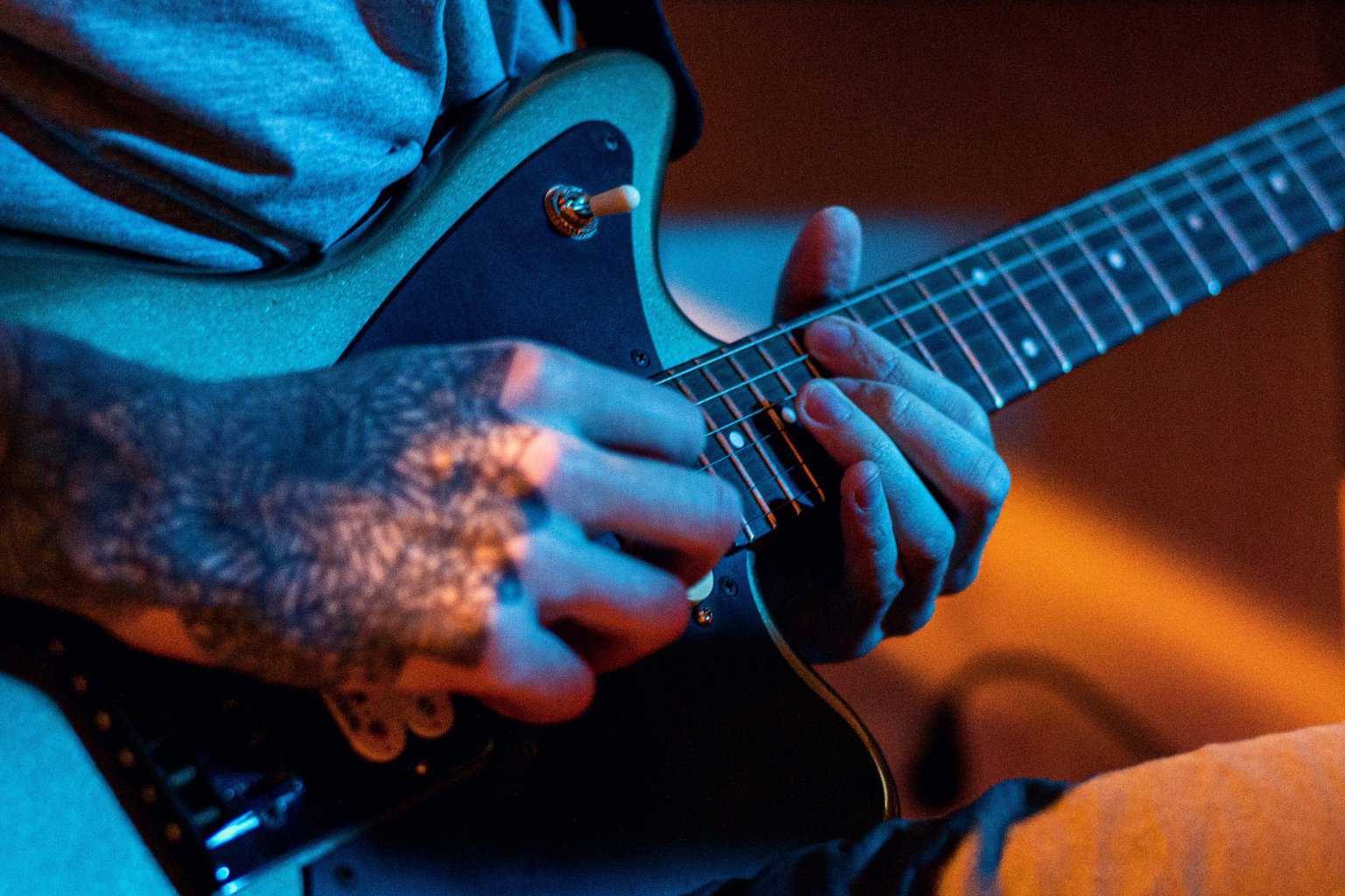The guitar is probably the most beloved instrument of them all.
It’s practical, popular, and adaptable.
With it, you can play rock, pop, metal, reggae, country, classical, blues, and tens of other music genres.
It is no surprise, then, to find hundreds of aspiring learners taking their first steps into music with a guitar.
Yet another foreseeable and common event is students giving in guitar too soon.
You might have heard people complaining about it
“Why should I? I wasn’t born with the talent to play.”
“I’m too old for this. I should have started when I was young.”
What am I saying? Maybe you are the one believing such excuses.
Despite what the rest says, here is the undeniable truth:
Everybody can learn guitar with patience, the proper methods, and dedication. It’s just a matter of time and consistency. Learning the basics only takes a couple of months or weeks, even if you are a “late” learner. Getting to master the instrument will take you years or even decades, however.
You might still have some doubts regarding your abilities.
That’s understandable.
The real issue, though, is doing nothing despite the fear.
Keep reading this article and you’ll see those insecurities disappear.
This is the fuel you are in need to start off playing guitar!
Do you need natural talent to play the guitar?
There are no fields in which one needs natural talent to achieve great results.
Yes, child prodigies exist, but in fact, natural-born geniuses are a rarity.
Another truth is that even the most brilliant musicians had to hone their craft to succeed.
Mozart, for instance, was one of them.
Despite being a gifted child, he practiced piano and studied music non-stop for years.
He earned his reputation. Otherwise, talent would have died out eventually.
The same goes for all those successful guitar heroes you hear every day.
They learned, practiced, and failed a lot before becoming masters of their field.
This means that anybody can take a guitar and start picking up the basics.
Yes. Some musicians grasp knowledge quicker than others.
I would be lying if I told you everyone learns at the same pace.
It should not matter, though. A step-by-step approach is the only approach towards playing guitar (or any other instrument, that being said).
Lastly, consider the following.
Learning the basics takes just a few weeks. If you are dedicated enough, maybe even days.
One way or the other, keep a steady rhythm, and never compare your progress with the rest of the players.
Is the guitar a hard instrument to learn?
The guitar is one of the most popular instruments to learn.
This happens because of plenty of reasons.
First of all, it is versatile, which means that it can be used for lots of music genres.
Second, and most importantly, guitars are easy to learn.
Of course, there’s a ton of music theory behind the guitar, and mastering it to the full requires decades of study.
However, learning the basics generally takes no longer than a month.
Once again, we find yet another great quality of the guitar: basic chords are more than enough to create good music.
What is more, guitars are easier to learn compared to other instruments.
The majority claim violin is the hardest string instrument to learn, for example.
Even piano could be considered harder than guitar.
On the one hand, the piano is more straightforward, and there is less room for mistakes. It turns out to be a rather simple instrument for beginners.
On the other hand, however, the piano gets trickier over time.
The more you learn, the hardest the techniques.
The guitar is an exception here since the more you play with it, the easier it gets.
All in all, the guitar can be slightly challenging the very first time you play with it.
Give it some time, and you’ll discover how easy it is.
What does it take to become good at guitar?
Becoming good at guitar compels dedication.
Practicing is not enough. One must commit to the instrument.
What I’m trying to say is that consistency is more relevant than the quantity of your practice session.
Think about it. It is better to rehearse every single day for an hour than to play for an entire morning just once a month.
No great musician is forged without dedication.
You must show off to work despite feeling unmotivated. You ought to take the guitar and practice for a while.
That is the ultimate approach towards betterment.
Of course, dedication is just a piece of the puzzle.
One also requires a high capacity to deal with frustration.
I’m not trying to disappoint you here, I’m trying to be realistic.
When learning guitar, you’ll be facing inefficiency and a lack of technique.
In other words, it is impossible to understand the theory or to successfully grasp techniques at once.
There’s going to be friction at the very beginning, and one mustn’t take it personally.
After all, the path towards mastery is filled both with small victories and tiny failures.
This means that climbing the mountain is not straightforward.
You’ll find yourself struggling one day with a chord and triumphantly playing two the next time you practice.
Prepare to face lots of ups and downs. It’s part of the process.
Last but not least, consider the importance of quantity.
I know that I pointed out that consistent playing is more relevant than the amount of it.
Needless to say, a huge gap of non-playing between session and session is futile.
You’ll learn nothing because muscle memory won’t develop itself.
However, the quantity it’s important too because a small number of hours will lead nowhere.
Do you know the 10,000 hours rule?
It is believed that to become an expert on a craft, one needs to sacrifice 10,000 hours to such a field.
The exact number is a myth, of course.
What’s not a myth is the fact that improvement demands hours of practice.
Take it easy. You’ll discover that a mere week or two are enough to create music.
Now, if you are considering surpassing the average level, weeks are not enough.
Be clairvoyant. See months, even years into the future.
You’ll realize how unimportant a poor lesson is for the biggest picture.
Trust in your inner abilities and desire to succeed.
Do it, because the more you play, the more you learn.
Do you need to study music theory to be good at guitar?
You are bound to learn music theory, but not the way you expect.
See, guitar involves understanding how tuning works.
There are scales, chords, and a specific order for the notes.
All of that is part of music theory. The thing is, it is not necessary to memorize it.
Information will be gradually absorbed.
All of a sudden, you find the notes on the fretboard without hesitations.
You know the names of the main chords, and you understand what an octave is.
Again, this is no high-school test. You genuinely acquire music theory knowledge over time.
Now, this is just the tip of the iceberg.
There is so much theory out there.
Bear in mind that you don’t need to understand everything to become a good guitarist.
Many learn to play by ear or figure the instrument out on their own.
As I said, the basics are digested without notice.
But overall, music theory can help you comprehend the instrument more deeply.
Consider it as a tool, a very useful one.
Is it a must? No, it is not.
Will it make you an overall better musician if you have it? It probably will.
What’s important here is that it shouldn’t be an excuse not to start learning.
It’s not as if you need music theory to start with guitar.
Just pick up the instrument and do what you can with it.
How long would it take to learn guitar properly?
Each one has its own learning goal.
Therefore, the amount of time it takes to learn guitar will vary according to those goals.
For example, if all you want is to learn a couple of songs successfully, then maybe a few months are enough.
However, if you want to handle it more thoroughly, then expect to practice with it for years.
Two years approximately are needed for being comfortable with the guitar. That is to say, really comfortable.
Mastering is a different thing because it requires decades of trial and error.
Time should never discourage you, though.
Take them as milestones of never-ending progress.
If your goal is to become a professional, then be content with the first months of learning.
In the end, those months are the ones that forge years of proficiency.
Can you learn guitar on your own?
Self-taught guitarists are not a minority.
For many, the first guitar’s approach tends to be without a teacher.
Maybe you find an old guitar in the basement and decide to give it a try.
Maybe a friend of yours lends it.
Either one way or the other, it is possible to pick up the basics on your own.
If not, you can still find other helpful methods to play guitar properly.
You may use Youtube tutorials, or you may gather with a group of friends and rehearse as a band.
There are so many possibilities.
We actually have an article where we discuss seven of them.
Read it and give them a try!
They could be the kick-starter you needed to become a guitarist.
Should you take guitar lessons?
It is always a great idea to take guitar lessons.
Even if you are already a professional, private lessons could help you improve even more.
There is always something that needs to be perfected, whether it be a specific technique or a new system.
In addition, a real teacher can guide you throughout the learning process.
Consider how necessary he or she is. There is so much to learn.
It’s rather easy to lose track of what should come next when being self-taught.
Also, acquiring a bad habit is a common issue self-learners face.
Teachers are there to detect and stop them before they fossilize.
If you want to know more reasons why guitar classes are so relevant, then check this article.
Conclusion
It’s so simple to get swallowed up by frustration.
One faces failure over and over again.
Why wouldn’t you feel like throwing in the towel?
Nonetheless, the mistake is not feeling like giving up. It is doing it.
The biggest professionals out there earned their place.
They worked their fingers to the bone. They stayed weekends at home honing their skills.
They cursed and dealt with frustration so much.
Still, they never lost track.
Now it is your time to become the best version of yourself.
Pick that guitar up. Complain and enjoy all the way.
It’s the only method.

Hello there, my name is Ramiro and I’ve been playing guitar for almost 20 years. I’m obsessed with everything gear-related and I thought it might be worth sharing it. From guitars, pedals, amps, and synths to studio gear and production tips, I hope you find what I post here useful, and I’ll try my best to keep it entertaining also.





